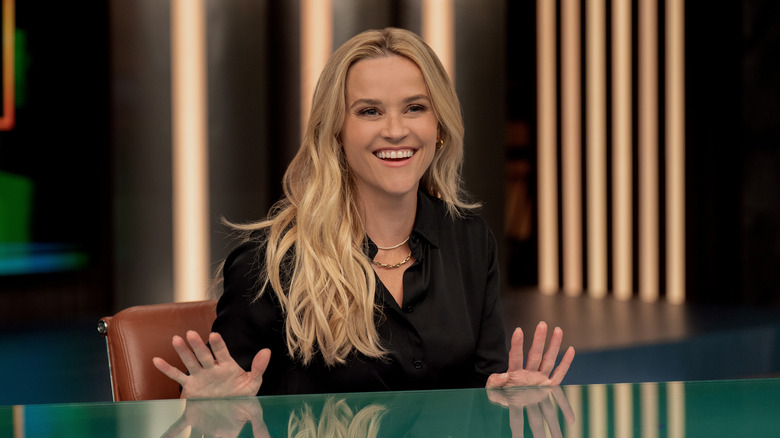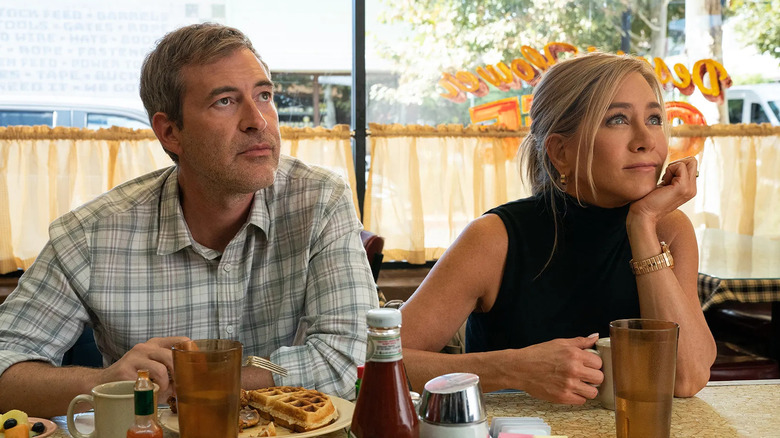The Morning Show Season 3 Review: Not A Great Way To Start The Day
- There are still incisively told, entertaining subplots about current events — but these take more of a sideline this time around
- The corporate takeover plot transforms the season into an inferior "Succession" clone
In its third season, "The Morning Show" is unambiguous in its desire to be crowned the new "Succession" now that HBO's critical juggernaut has finished. After two seasons straddling the line between prestige TV and A-list soap opera, tackling sensitive, hot-button issues with a keen sense of melodrama and a lack of thematic subtlety, this latest batch of 10 episodes mostly strays away from heavy-handed attempts at social commentary, for better and for worse.
As with the third season of the Roy Family saga, this time around we're introduced to an unconventional billionaire (Paul Marks, played by Jon Hamm) who wants to buy out a media empire solely to diversify his portfolio — and as with that show's final season, the fates of all these characters hinge on tense shareholder meetings and corporate backstabbing among all parties involved. Because of this, Season 3 is unquestionably the show's worst outing to date, with these characters proving far less interesting when they're not worried about falling under the spotlight of a major scandal.
Dark days at UBA
Yes, later episodes in the season revert to exploring the slippery ethics of star anchor Bradley Jackson (Reese Witherspoon) when she uncovers a personal connection to a national news story — but this is barely given more screen time than the average subplot, introduced too late in the season to properly drive the narrative. The corporate takeover at the core this time is nowhere near as prickly or devastating as the show's best plots to date; a soap opera is less fun when its heightened theatrics are all in service of a plodding mystery about a shady billionaire's motivations for buying out a media conglomerate.
You could uncharitably call this season "Succession" for laymen, but the reality is far closer to a vanity project from Sarah Snook's Shiv Roy about her time in the upper echelons of the media. We pick up two years after the previous season, with Bradley Jackson now the evening news anchor on UBA and her former co-host Alex Levy (Jennifer Aniston) comfortably remaining as the host of the flagship breakfast program, as well as her own interview show on the network's streaming platform UBA+. But because they have a streaming platform and are struggling to make that stand out in a crowded marketplace — a bit of satire I'm surprised Apple TV+ didn't ask them to remove altogether — the network is hemorrhaging money, and CEO Cory Ellison (Billy Crudup) has quietly started looking for someone to buy out the company before it goes bust.
Cory has primarily been courting Paul Marks, a billionaire best known for the space exploration program operated by his company Hyperion — as with Alexander Skarsgård's Lukas Mattson in "Succession," what appears to be an obvious surrogate for Elon Musk turns out to be, well, just another billionaire, only this one has even less in the way of quirk. In scenes that will have even the staunchest defenders of this already very silly show arguing a shark may have been jumped, Paul's first bid to forge ties between the companies is via sending one of the "Morning Show" anchors on one of his shuttles to space and broadcasting it live on TV. It should be the beginning of a partnership, but it goes disastrously, and things go from bad to worse when the network is hacked shortly afterward. They're pulled immediately off-air, but not before the personal files and emails of its executives and top-level talent are leaked online.
After two seasons documenting the struggles of being a woman in the workplace, both before and after the #MeToo movement made headlines, it's something of a disappointment that several potential plotlines this leak teases out are thrown aside with little exploration, even as they bring to light prescient struggles about women being "doxxed" in the media. However, the one thing this season does have over prior outings is the more specific examination of being a high-ranking woman of color within this workplace. The leak of a racist email from a UBA executive, for example, leads to an incisive examination of the company's attempts to diversify the workforce while maintaining its traditional power structures — hard-hitting subject matter dramatized in an unashamedly populist manner, and the narrative strand that would feel most at home in the two previous, significantly better, seasons. The similarly slow crawl to power undertaken by Stella Bak (Greta Lee), the network's president of news, is one of the better-realized character arcs this time around — in fact, the biggest surprise might be that Crudup's eccentric CEO is far less arresting a presence than he was before.
Not the entertaining cultural commentary it once was
When he was first introduced, Cory Ellison was the show's most magnetic figure, a slippery presence who was simultaneously on everybody's side and no one's, a guy who talks to the room in a way where you can't tell if he's trying to empathize or condescend. The more the real man behind this carefully constructed, business-savvy artifice is exposed, the less dramatically interesting he is — Billy Crudup's role has been increasingly beefed up in every season, and as a result, a mysterious boss now feels too familiar. We get introduced to his family in one episode, while the actor's performance becomes distracting in how it recycles the same old hyperspecific mannerisms. I imagine this won't do anything to dilute his Emmy nomination prospects, but it's a shame to see the show's most entertaining character become a walking parody of himself.
Elsewhere, the show touches on the same subjects of "woke culture" and fears of getting canceled that have kept these characters up at night in prior seasons — their biggest fear continuing to be receiving the lightest of pushbacks on social media. To circle back to my take that the show now resembles what an Aaron Sorkin-style series about the media industry would look like if written by "Succession" character Shiv Roy, it's telling that this is the season where the characters are most removed from the outside world.
"The Morning Show" has always been a satire about how the concerns of the elite clash with an ever-changing society outside, but now the only voices outside of UBA that are relevant are those with hefty pockets of cash; this season is only interesting when those on the peripheries of major influence at the network start interrogating how the power structure operates. It is frequently entertaining, but it's far less incisive in its cultural commentary than it once was, even as it's straining to dramatize more recent headlines than ever. Exploring those in more detail is yet another victim of UBA's corporate takeover.
The first two episodes of "The Morning Show" Season 3 are streaming from today on Apple TV+. New episodes will then be released every Wednesday.
This piece was written during the 2023 WGA and SAG-AFTRA strikes. Without the labor of the writers and actors currently on strike, the series being covered here wouldn't exist.


